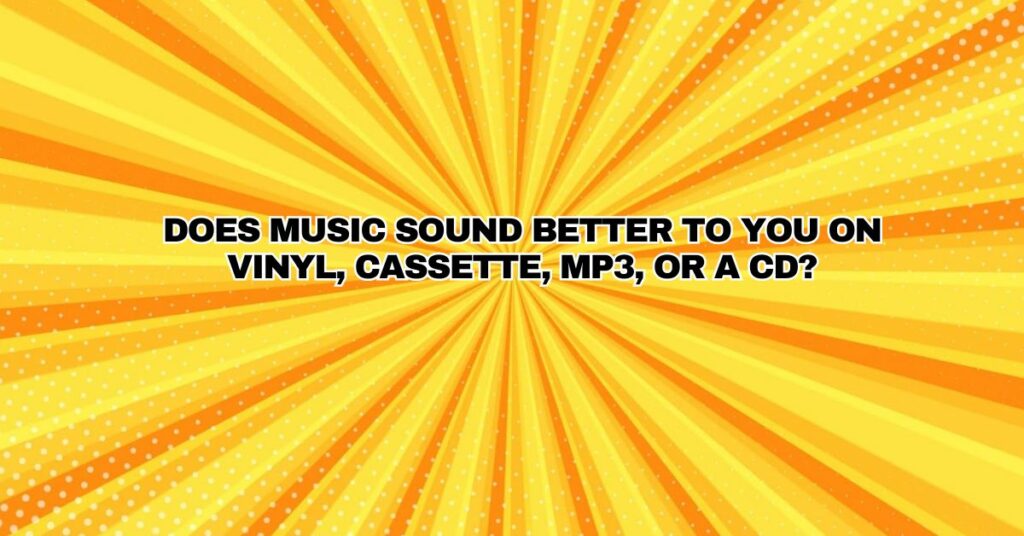The debate over which music format sounds the best has been a long-standing conversation among audiophiles and music enthusiasts. The choice between vinyl, cassette, MP3, and CD audio often comes down to personal preferences, listening equipment, and individual experiences. In this comprehensive guide, we will explore the characteristics and perceived sound quality of these formats, shedding light on the complexities of the audiophile dilemma.
Vinyl Records: The Warmth of Analog
Vinyl records have made a remarkable resurgence in recent years, attracting a dedicated fan base of music purists and collectors. Here’s what makes vinyl special:
- Analog Warmth: Vinyl’s analog format imparts a warmth and depth to the music that many find captivating. It adds a subtle character and richness to the sound, often described as “analog warmth.”
- Tactile Experience: Handling vinyl records, from carefully placing the needle on the groove to flipping sides, adds a tactile and almost ritualistic dimension to the listening experience. Many vinyl enthusiasts appreciate this hands-on interaction.
- Album Art and Packaging: Vinyl allows for larger album artwork and creative packaging. Musicians and artists use the physicality of the format to express themselves artistically.
- Collector’s Appeal: Vinyl records, especially rare or limited editions, have significant collector’s value. The hunt for unique pressings and hidden gems in record stores and flea markets is part of the vinyl experience.
Cassette Tapes: The Nostalgic Resurgence
Cassette tapes, once seen as relics of the past, have made an unexpected comeback. Here’s why some listeners are drawn to cassettes:
- Nostalgia: Cassettes hold a special place in the hearts of those who grew up with them. The format evokes a sense of nostalgia and sentimentality.
- Imperfections: Cassettes introduce certain analog imperfections, such as hiss and wow/flutter, which some listeners find charming and nostalgic.
- Indie and DIY Culture: Cassettes have become a medium for independent and DIY musicians to release their music. The format represents a counter-cultural alternative to mainstream media.
MP3: The Digital Convenience
MP3, a digital audio format, has revolutionized the way we consume and store music. Here’s why many people appreciate MP3:
- Portability: MP3 files can be easily stored on digital devices and offer unmatched portability. This format allows users to carry vast music collections in their pockets.
- Convenience: MP3 files are easy to download, share, and organize. Digital music libraries can be efficiently managed and customized.
- Lossy Compression: MP3 uses lossy compression, which reduces file sizes while maintaining good sound quality. The trade-off is a slight reduction in audio fidelity, but it’s often imperceptible to the average listener.
Compact Discs (CDs): The Digital Standard
Compact discs have been a staple of music distribution since the 1980s. Here’s what makes CDs appealing:
- Sound Clarity: CDs offer precise and clean sound quality with minimal noise and distortion. The digital format ensures consistent audio fidelity.
- Durability: CDs are resistant to physical damage, such as scratches and warping. With proper care, they can provide a lifetime of reliable listening.
- Consistency: Every copy of a CD from the same recording should sound identical. This uniformity is crucial for audiophiles who prioritize accuracy.
The Subjective Nature of Sound Quality:
The perception of which format sounds “better” varies widely among listeners and depends on individual preferences, equipment, and listening environments. The following factors play a significant role:
- Audio Equipment: The quality of audio equipment, including turntables, cassette decks, MP3 players, and CD players, significantly influences the listening experience.
- Mastering and Production Quality: The quality of mastering and production for each format can vary, impacting sound quality.
- Listening Environment: Factors such as room acoustics, speaker placement, and background noise can affect the overall listening experience.
- Listener Preferences: Personal taste plays a vital role in determining which format an individual finds most appealing. Some listeners may prioritize the warmth of vinyl, while others appreciate the convenience of MP3.
Debunking Myths:
Several myths are associated with the vinyl, cassette, MP3, and CD debate:
- Myth: Vinyl always sounds better. The sound quality of vinyl depends on various factors, including the mastering and pressing quality. Not all vinyl records automatically surpass other formats in sound quality.
- Myth: Cassettes are always noisy and low-fidelity. High-quality cassette decks and tapes can deliver a surprisingly good listening experience with minimal noise.
- Myth: MP3s are always inferior in sound quality. Well-encoded MP3s can provide good audio quality, especially at higher bit rates. The perception of reduced quality is often subjective.
- Myth: CDs are lifeless and clinical. CDs offer accurate and clean sound quality, which many listeners appreciate for its fidelity and transparency.
Conclusion: The Beauty of Diversity
The debate over which format sounds the best is subjective, personal, and often influenced by nostalgia. Each format offers a unique listening experience, and the choice ultimately depends on individual preferences and contexts.
The rich diversity of formats available to music lovers highlights the various ways people connect with and appreciate music. Whether you prefer the warmth of vinyl, the nostalgia of cassettes, the convenience of MP3, or the clarity of CDs, each format contributes to the enchanting world of music and audio, ensuring that the magic of sound is accessible to all, regardless of the medium.


